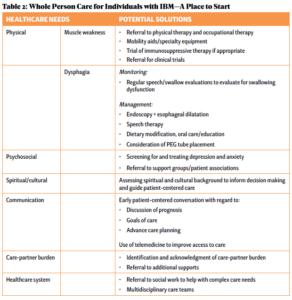Reflecting back, Mrs. F thinks earlier goals-of-care conversations would have been helpful. And as Mr. F continued to decline, there was no central person to guide them through the process.
Discussion
IBM is a serious and devastating illness without any known, effective cure. Excellent person-centered care of patients with IBM and their care partners must include palliative care—identification and management of total suffering, which includes physical, psychosocial, spiritual/existential and financial distress. Increasing access to palliative care requires educating rheumatologists about how to incorporate palliative care modalities into their management framework and identifying when referral to specialty palliative care is appropriate (see Table 2).
Complex symptom management is part of holistic IBM care.
Like Mr. F, many individuals with IBM have limited contact with the healthcare system after diagnosis because of the perception that available medical care is futile given the incurable nature of the disease; however, addressing symptom burden may not only relieve suffering, but may also improve the patient’s ability to continue receiving IBM-directed therapies.
For example, regular evaluation for swallowing dysfunction can allow for earlier interventions with such procedures as esophageal dilations or speech therapy, and prompt early conversations regarding PEG placement.6,7 Management of dysphagia, such as dietary modification, oral care and education, can be beneficial in managing symptoms for individuals with IBM and progressive swallowing dysfunction.8
Diaphragm weakness and respiratory failure can also be seen. When Mr. F’s respiratory status was declining, a pulmonologist put him on a bi-level positive airway pressure machine (BiPAP) machine at night, as well as a cough assist machine, interventions his wife felt improved his quality of life and prolonged his life. Routine incorporation of physical therapy and occupational therapy is the mainstay of treatment to maintain strength and prevent muscle atrophy for individuals with IBM. Early referral and regular monitoring can allow adoption of adaptive strategies/assistive devices to maintain physical function and prevent falls secondary to IBM.6,9
Further, Mr. F struggled with untreated depression and anxiety surrounding his illness, which were left unmanaged throughout the course of his illness and negatively impacted his quality of life.
High-quality communication facilitates exploration of goals & complex decision making.
Poor communication and the lack of timely goals-of-care discussions exacerbated the turmoil and isolation that Mr. and Mrs. F experienced. Discussions surrounding PEG tube placement were limited and did not incorporate Mr. F’s preferences surrounding his care. Informed, shared decision making is necessary when considering this procedure because it has not been found to prevent aspiration.



